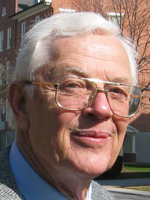 |
| Herman G. Stuempfle Jr. (LUTHERAN THEOLOGICAL SEMINARY AT GETTYSBURG) |
This is not a eulogy for Herm Stuempfle. There’s been enough of that since he died on March 13, and I’m not at all sure I knew him well enough to eulogize him in any event. But Dr. Stuempfle was the first seminary president I knew. I met him, predictably enough, when I enrolled at the Lutheran Theological Seminary at Gettysburg in the early 1980s, when he was in the middle of his presidential tenure.
His was a benignly paternal presence for students, most of whom (myself emphatically included) had not a clue about the scope of his job description. But he was accessible, and if a visit to his office yielded no concrete results, at least one felt that one had been heard. He was always teacher as well as administrator, which was a vital part of the persona.
Churchman though he was, there was an air of innocence around him. Some students hired a belly dancer to entertain on his birthday. The dance was tasteful, high good humor notwithstanding. Stuempfle was gracious (he offered the dancer a chair in Near Eastern studies) but a bit discomfited. The payoff came a few months later at graduation. I introduced Dr. Stuempfle to my sister — the dancer — since he clearly wasn’t making a connection. He blinked once or twice and said, “Of — of course. I didn’t recognize you dressed.”
I’ve met more than my share of seminary presidents since then, and an assorted lot they are. Urbane and aggressively folksy; intellectual and pastoral; mean-spirited, fraudulent, pious, pragmatic — each of those is a first reaction as I look over a list of leaders I’ve interviewed. It works best when there is some congruence between the president’s personality and that of the school, but sometimes that slips into caricature, and not for the best. I recall interviewing the new and promising leader of an old and prestigious school, and leaving with the sense that I’d understood only a fraction of what he’d said. Right guy for that place, I thought. Six months later he was gone. I suspect that nobody else understood him either, and not by reason of intellectual inadequacy.
Maybe most of these leaders in theological education are heroic. They tell bloodcurdling tales of financial crises, challenging constituents, seemingly insurmountable circumstances. Sometimes they even tell these stories on the record. But presidents stand as centers of hope, as touchstones of possibility, and they do it by personifying the school.
I remember one president who surprised me twice within minutes of our meeting: He asked me for money (not much, but he was determined to give everyone the opportunity to make a small — and I do mean small — gift). And he prayed for me before our interview began. He’s the only president ever to have done either. As I thought about it, it was exactly the right tone for his school, which, like so many, was full of goodwill, full of faith, but in financial freefall. He turned out not to be messiah for the institution, which was a good thing (one of his predecessors had styled himself so and had made a quite spectacular mess), but he did help open some new possibilities that kept the school open and fulfilling at least some part of its mission.And his willingness to offer what he had (prayer) and ask for what he didn’t (money) was a part of how he provided the public face of his school. Not bad.
One of my classmates, who later became his bishop, did eulogize Herman Stuempfle. Among other things, she characterized him as a “gracious, gentle man whose life we celebrate.”
Perhaps we should pray that God might give us the kind of schools that can be led and represented by gracious, gentle people.




























